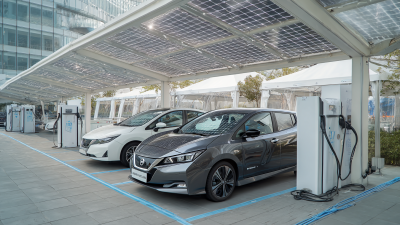The travel industry is on the brink of a revolutionary shift towards sustainability, with solar powered EV charging stations leading the charge. According to a 2023 report by the International Energy Agency (IEA), the global electric vehicle (EV) market is projected to reach over 145 million units by 2030, driving an increasing demand for accessible and eco-friendly charging solutions. Integrating renewable energy sources, such as solar power, into electric vehicle infrastructure not only enhances the environmental benefits but also aligns with the global push for carbon neutrality.

A study from the Global EV Outlook indicates that solar powered EV charging stations could reduce greenhouse gas emissions significantly, contributing to a cleaner future. As more travelers seek eco-conscious options, the implementation of solar powered EV charging systems is essential for unlocking the future of sustainable travel, providing both convenience and environmental stewardship for the next generation of travelers.
The integration of solar-powered EV charging stations represents a significant advancement in sustainable travel. As the world shifts towards renewable energy, these stations not only reduce dependence on fossil fuels but also empower travelers to utilize clean energy during their journeys. According to a report by the International Energy Agency (IEA), electric vehicle sales are projected to reach 58 million by 2030, showcasing a growing demand for accessible and environmentally friendly charging infrastructure. With solar-powered stations, this demand can be met while minimizing carbon footprints and promoting eco-friendly practices.
Moreover, solar-powered charging stations can greatly enhance the efficiency and viability of electric vehicle travel. A study from the National Renewable Energy Laboratory indicates that implementing solar chargers could reduce greenhouse gas emissions by up to 80% compared to traditional charging sources, particularly in urban areas where pollution is a concern. Additionally, these stations can operate off-grid, establishing charging availability in remote locations, thus transforming the entire travel experience by enabling sustainable routes in harmony with the environment. As communities embrace this technology, they pave the way for greener travel solutions that are crucial for future generations.
This bar chart represents the growth of installed solar powered EV charging stations from 2020 to 2024. As the demand for sustainable travel increases, the number of these eco-friendly charging stations is expected to rise significantly, contributing to a greener travel future.
The rise of electric vehicle (EV) adoption has transformed the travel landscape, paving the way for a greener future. According to a recent report by the International Energy Agency (IEA), global EV sales reached 6.6 million units in 2021, representing a staggering 108% increase over the previous year. This surge in EV adoption not only highlights a growing consumer preference for sustainable travel options but also underscores the importance of developing infrastructure that supports this transition. The establishment of solar-powered EV charging stations is a critical step toward enhancing the feasibility and appeal of electric travel.
As more travelers opt for electric vehicles, the demand for convenient and eco-friendly charging solutions is set to rise. A study from the World Economic Forum indicated that to meet the anticipated increase in EV usage, approximately 30 million public charging points will be needed by 2030. Implementing solar-powered charging stations can complement this need by utilizing renewable energy, thereby reducing carbon footprints and promoting sustainability in the travel sector. This synergy not only fuels the growth of electric travel but also encourages stakeholders to invest in green technologies, facilitating a holistic approach to eco-friendly travel solutions.
| Region | Number of Solar EV Charging Stations | Average Daily Charging Sessions | Percentage of Electric Vehicles (EVs) on the Road (%) | Projected Growth Rate of EV Adoption (%) |
|---|---|---|---|---|
| North America | 1,500 | 600 | 5% | 20% |
| Europe | 2,800 | 900 | 8% | 25% |
| Asia | 3,200 | 1,200 | 7% | 30% |
| Australia | 700 | 300 | 4% | 15% |
| South America | 300 | 120 | 2% | 10% |
The integration of solar energy into transportation infrastructure, particularly through solar-powered EV charging stations, presents a significant opportunity to reduce the environmental impact of travel. According to a 2022 report by the International Renewable Energy Agency (IRENA), the shift toward renewable energy sources in the transportation sector could cut greenhouse gas emissions by up to 70% by 2050. Solar energy not only provides a cleaner alternative to fossil fuels but also enhances the sustainability of electric vehicles (EVs) by creating a self-sustaining ecosystem for their use and maintenance.

One of the most compelling benefits of solar-powered charging stations is their ability to harness energy directly from the sun, which can reduce dependence on the grid and lower operational costs. The National Renewable Energy Laboratory (NREL) indicates that implementing solar power in EV charging could potentially save facility operators thousands of dollars annually in energy costs while significantly decreasing the carbon footprint associated with vehicle charging.
Tips for Eco-Friendly Travel:
- Consider using apps that map out solar-powered charging stations along your route to maximize the environmental benefits of your travel plans.
- Pair your EV travel with solar home charging systems, which can allow you to maximize your use of renewable energy both at home and on the go.
- Participate in local initiatives that promote solar energy integration, helping to pave the way for broader adoption of sustainable practices in transportation.
The future of eco-friendly travel is increasingly intertwined with the growth of solar-powered electric vehicle (EV) charging stations. According to recent industry statistics, the market for EV charging cables is essential as it encompasses the production, distribution, and commercialization of cables needed for residential, commercial, and public charging networks. This segment is experiencing a significant uptick, driven by the rising adoption of electric vehicles worldwide, which has been catalyzed by a global shift toward sustainable energy solutions.

In China, for example, electric vehicles have gained substantial attention under the so-called "new three gems" of exports, which include solar products, electric cars, and power batteries. The demand for charging infrastructure is not only seen as a necessity for vehicle owners but also as a pivotal component in addressing environmental challenges. The recent forecast for the electric vehicle charging pile industry indicates a growing market size and competitive landscape, highlighting a promising trajectory well into 2025. The increasing integration of solar technology into charging infrastructure presents a unique opportunity to marry renewable energy with transportation, positioning solar-powered stations as a cornerstone of sustainable travel in the coming years.
The integration of solar-powered EV charging stations represents a significant leap towards a more sustainable travel ecosystem. By harnessing solar energy, these stations can charge electric vehicles while minimizing reliance on fossil fuels, thus reducing the carbon footprint associated with travel. Several innovative case studies have showcased successful implementations of solar-fueled travel solutions, demonstrating not only their environmental benefits but also their potential for enhancing energy access in low-income communities.
One notable example involves the use of solar charging stations at popular tourist destinations, which not only provide free energy to travelers but also draw attention to renewable energy practices. These installations not only aid in decarbonizing travel but also create opportunities for local governments and organizations to promote sustainability and reduce operational costs.
**Tip:** To maximize the efficiency of solar-powered charging stations, it is crucial to consider optimal placement and the integration of smart grid technologies that facilitate energy distribution based on demand. Another important aspect is community engagement, as grassroots support can significantly enhance the success and longevity of these projects, fostering a culture of sustainability.






